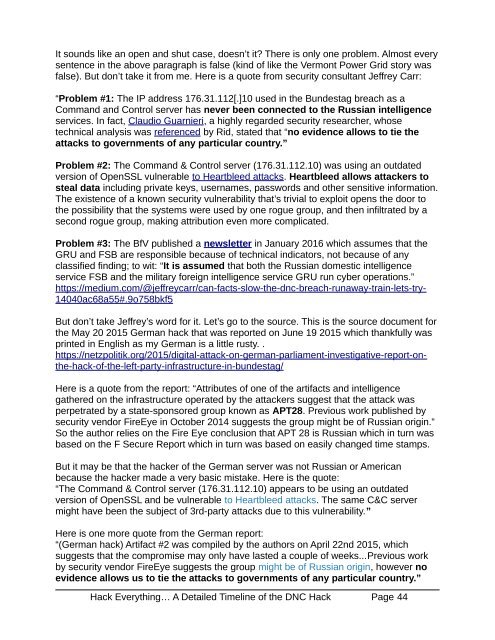You also want an ePaper? Increase the reach of your titles
YUMPU automatically turns print PDFs into web optimized ePapers that Google loves.
It sounds like an open and shut case, doesn’t it? There is only one problem. Almost every<br />
sentence in the above paragraph is false (kind of like the Vermont Power Grid story was<br />
false). But don’t take it from me. Here is a quote from security consultant Jeffrey Carr:<br />
“Problem #1: The IP address 176.31.112[.]10 used in the Bundestag breach as a<br />
Command and Control server has never been connected to the Russian intelligence<br />
services. In fact, Claudio Guarnieri, a highly regarded security researcher, whose<br />
technical analysis was referenced by Rid, stated that “no evidence allows to tie the<br />
attacks to governments of any particular country.”<br />
Problem #2: The Command & Control server (176.31.112.10) was using an outdated<br />
version of OpenSSL vulnerable to Heartbleed attacks. Heartbleed allows attackers to<br />
steal data including private keys, usernames, passwords and other sensitive information.<br />
The existence of a known security vulnerability that’s trivial to exploit opens the door to<br />
the possibility that the systems were used by one rogue group, and then infiltrated by a<br />
second rogue group, making attribution even more complicated.<br />
Problem #3: The BfV published a newsletter in January 2016 which assumes that the<br />
GRU and FSB are responsible because of technical indicators, not because of any<br />
classified finding; to wit: “It is assumed that both the Russian domestic intelligence<br />
service FSB and the military foreign intelligence service GRU run cyber operations.”<br />
https://medium.com/@jeffreycarr/can-facts-slow-the-dnc-breach-runaway-train-lets-try-<br />
14040ac68a55#.9o758bkf5<br />
But don’t take Jeffrey’s word for it. Let’s go to the source. This is the source document for<br />
the May 20 2015 German hack that was reported on June 19 2015 which thankfully was<br />
printed in English as my German is a little rusty. .<br />
https://netzpolitik.org/2015/digital-attack-on-german-parliament-investigative-report-onthe-hack-of-the-left-party-infrastructure-in-bundestag/<br />
Here is a quote from the report: “Attributes of one of the artifacts and intelligence<br />
gathered on the infrastructure operated by the attackers suggest that the attack was<br />
perpetrated by a state-sponsored group known as APT28. Previous work published by<br />
security vendor FireEye in October 2014 suggests the group might be of Russian origin.”<br />
So the author relies on the Fire Eye conclusion that APT 28 is Russian which in turn was<br />
based on the F Secure Report which in turn was based on easily changed time stamps.<br />
But it may be that the hacker of the German server was not Russian or American<br />
because the hacker made a very basic mistake. Here is the quote:<br />
“The Command & Control server (176.31.112.10) appears to be using an outdated<br />
version of OpenSSL and be vulnerable to Heartbleed attacks. The same C&C server<br />
might have been the subject of 3rd-party attacks due to this vulnerability.”<br />
Here is one more quote from the German report:<br />
“(German hack) Artifact #2 was compiled by the authors on April 22nd 2015, which<br />
suggests that the compromise may only have lasted a couple of weeks...Previous work<br />
by security vendor FireEye suggests the group might be of Russian origin, however no<br />
evidence allows us to tie the attacks to governments of any particular country.”<br />
<strong>Hack</strong> <strong>Everything…</strong> A Detailed Timeline of the DNC <strong>Hack</strong> Page 44


